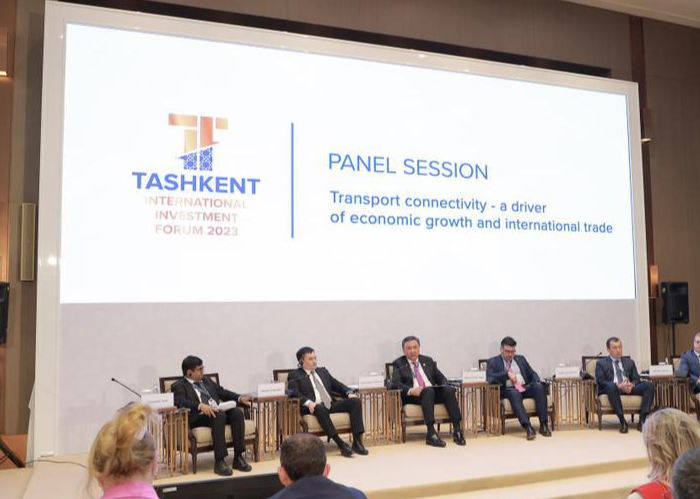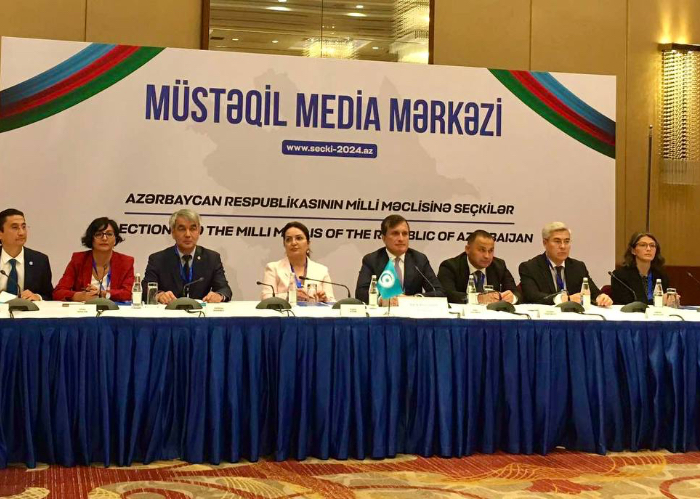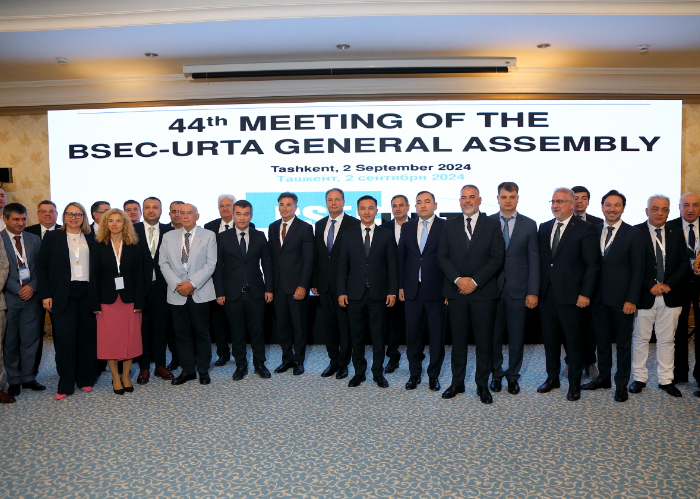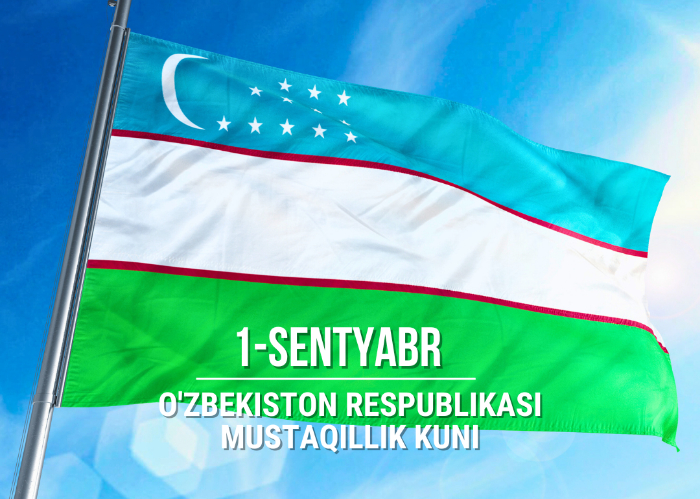The Secretary General of the Organization of Turkic States (OTS), Kubanychbek Omuraliev participated in the 2nd Tashkent International Investment Forum held on 27-28 April 2023 in Tashkent.
On April 27, Ambassador Omuraliev attended the Plenary Session of the Forum, with participation of the President of the Republic of Uzbekistan H.E. Shavkat Mirziyoyev and H.E. Dr. Muhammad Sulaiman Al Jasser, President, Islamic Development Bank, H.E. Akylbek Japarov, Head of the Presidential Administration - Chairman of the Cabinet of Ministers of the Republic of Kyrgyzstan,Olga Algayerova, Executive Secretary, United Nations Economic Commission for Europe (UNECE), Suhail Mohamed Al Mazrouei, Minister of Energy and Infrastructure of the United Arab Emirates, H.E. Márton Nagy, Minister of Economic Development of Hungary, Mr. Mohammad A. Abunayyan, Chairman of the Board of Directors of ACWA Power.
In his opening speech President Shavkat Mirziyoyev informed the audience about the systemic reforms aimed at further liberalizing the country's economy, creating broad opportunities for entrepreneurs, ensuring the rule of law in these areas and strengthening legal guarantees.
He stressed that, Uzbekistan has achieved great progress in creating the most favourable fiscal system in the region. Thus, the value added tax rate was reduced to 12 percent, the income of foreign investors in the form of dividends on shares is exempt from income tax for a period of three years, for them the income tax rate is reduced from 20 to 12 percent. The Head of State mentioned the introduction of new or more stringent liability measures into the tax and customs legislation, as well as further step to liberalize foreign trade.
President Mirziyoyev also listed new opportunities for expanding cooperation, such as continuing the course of transition to a "green economy", continuing work on creating a competitive environment in the transport sector, further privatization of state property, bringing industrial development to a new level and etc.
In their remarks, the Panelists shared their vision of the prospects for the development of Uzbekistan.
Secretary General of OTS Kubanychbek Omuraliev took part in the breakout panel session on the theme of ““Transport interconnectivity is a driver of economic growth and international trade” during the 2nd Tashkent International Investment Forum.
The Panel session moderated by Mr. Shashank Rath, Partner, Synergy Consulting and attended by panelists H.E. Ilkhom Mahkamov, Minister, Ministry of Transport of the Republic of Uzbekistan, Mr. Mario Antonio Ebcim, Director, Strategy & Market Development, Boeing, Mr. Kanat Alpysbayev, Managing Director for Western & Central Asia, Alstom, Mr. Mikhail Volkov, Managing Director and Partner, BCG.
Secretary General Omuraliev emphasized the contribution of the OTS to strengthening cooperation in the field of trade, investment and transport connectivity between OTS countries, in particular their efforts to improve transport infrastructure, which is which is of great importance for the development of various international transport corridors and trade flows and services throughout the region.
Speaking about the role Trans-Caspian International East-West Middle Corridor, (known as the "Middle Corridor") for the economic and trade development of OTS region, Secretary General briefed the attendees on the main ongoing activities and various mechanisms carried out by Organization to increase the attractiveness of the corridor, including efforts towards digitalization of transport and transit procedures and foster interregional trade and transport connectivity.
Then panelists discussed and exchanged their views on the transport and transit potential of the Middle Corridor. They highlighted some of the benefits and challenges faced by logistics companies on this transport route, in particular the level of existing infrastructure requiring significant investment to modernize and modernize; multimodality and relatively high cost of transportation along the Corridor and regulatory issues (legal and administrative).
On April 27, Ambassador Omuraliev attended the Plenary Session of the Forum, with participation of the President of the Republic of Uzbekistan H.E. Shavkat Mirziyoyev and H.E. Dr. Muhammad Sulaiman Al Jasser, President, Islamic Development Bank, H.E. Akylbek Japarov, Head of the Presidential Administration - Chairman of the Cabinet of Ministers of the Republic of Kyrgyzstan,Olga Algayerova, Executive Secretary, United Nations Economic Commission for Europe (UNECE), Suhail Mohamed Al Mazrouei, Minister of Energy and Infrastructure of the United Arab Emirates, H.E. Márton Nagy, Minister of Economic Development of Hungary, Mr. Mohammad A. Abunayyan, Chairman of the Board of Directors of ACWA Power.
In his opening speech President Shavkat Mirziyoyev informed the audience about the systemic reforms aimed at further liberalizing the country's economy, creating broad opportunities for entrepreneurs, ensuring the rule of law in these areas and strengthening legal guarantees.
He stressed that, Uzbekistan has achieved great progress in creating the most favourable fiscal system in the region. Thus, the value added tax rate was reduced to 12 percent, the income of foreign investors in the form of dividends on shares is exempt from income tax for a period of three years, for them the income tax rate is reduced from 20 to 12 percent. The Head of State mentioned the introduction of new or more stringent liability measures into the tax and customs legislation, as well as further step to liberalize foreign trade.
President Mirziyoyev also listed new opportunities for expanding cooperation, such as continuing the course of transition to a "green economy", continuing work on creating a competitive environment in the transport sector, further privatization of state property, bringing industrial development to a new level and etc.
In their remarks, the Panelists shared their vision of the prospects for the development of Uzbekistan.
Secretary General of OTS Kubanychbek Omuraliev took part in the breakout panel session on the theme of ““Transport interconnectivity is a driver of economic growth and international trade” during the 2nd Tashkent International Investment Forum.
The Panel session moderated by Mr. Shashank Rath, Partner, Synergy Consulting and attended by panelists H.E. Ilkhom Mahkamov, Minister, Ministry of Transport of the Republic of Uzbekistan, Mr. Mario Antonio Ebcim, Director, Strategy & Market Development, Boeing, Mr. Kanat Alpysbayev, Managing Director for Western & Central Asia, Alstom, Mr. Mikhail Volkov, Managing Director and Partner, BCG.
Secretary General Omuraliev emphasized the contribution of the OTS to strengthening cooperation in the field of trade, investment and transport connectivity between OTS countries, in particular their efforts to improve transport infrastructure, which is which is of great importance for the development of various international transport corridors and trade flows and services throughout the region.
Speaking about the role Trans-Caspian International East-West Middle Corridor, (known as the "Middle Corridor") for the economic and trade development of OTS region, Secretary General briefed the attendees on the main ongoing activities and various mechanisms carried out by Organization to increase the attractiveness of the corridor, including efforts towards digitalization of transport and transit procedures and foster interregional trade and transport connectivity.
Then panelists discussed and exchanged their views on the transport and transit potential of the Middle Corridor. They highlighted some of the benefits and challenges faced by logistics companies on this transport route, in particular the level of existing infrastructure requiring significant investment to modernize and modernize; multimodality and relatively high cost of transportation along the Corridor and regulatory issues (legal and administrative).





















